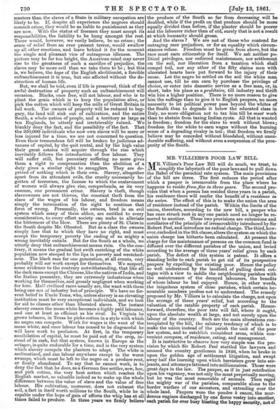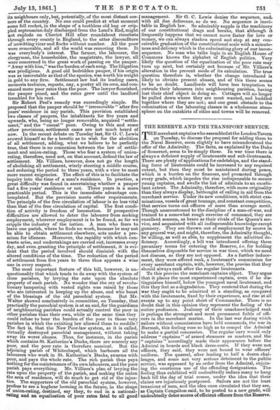MR. VILLIERS'S POOR LAW BILL.
MR. Villiers's Poor Law Bill will do much, we trust, to simplify the labyrinth of the poor laws and to pull down the Babel of the parochial rate system. The main provisions of the bill are three. The first reduces the period after which a pauper is irremovable from the place where he happens to reside from five to three years. The second pro- vides that when a person has resided three years in a parish, his residence there will confer the benefit of a residence in the anion. The effect of this is to make the union the area of residence instead of the parish. Within the limits of the union, therefore, according to the new bill, a pauper who has once struck root in any one parish need no longer be re- moved to another. These two provisions are extensions and corollaries of the principle of irremovability introduced by Sir Robert Peel, and introduce no radical change. The third, how- ever, embodied in the 9th clause, alters the system on which the union charge has hitherto been calculated. At present the charge for the maintenance of persons on the common fund is diffused over the different parishes of the union, and levied according to the average of three years' relief given by each parish. The defect of this system is patent. It offers a standing bribe to each pariah to get rid of its prospective paupers by expelling the existing poor. Hence the policy so well understood by the landlord of pulling down cot- tages with a view to saddle the neighbouring parishes with the maintenance of the decayed labourers, the benefits of whose labour he had enjoyed. Hence, in other words, the iniquitous system of close parishes, which certain ho- nourable members profess not to understand. The remedy proposed by Mr. Villiers is to calculate the charge, not upon the average of three years' relief, but according to the valuation of the ratable property of each parish. Hence- forward, therefore, the poor rate will fall, where it ought, upon the absolute wealth at large, and not merely upon the labour of the country. Such are the main alterations con- templated by the bill, the salutary tendency of which is to make the union instead of the parish the unit of the poor law system, and to establish coincident areas, within con- venient compass, of residence, rating, and management. It is instructive to observe how very simple was the pro- vision by which Sir Robert Peel startled the lawyers and amazed the country gentlemen in 1846, when he broke in upon the golden age of settlement litigation, and swept away half the learning upon which barristers grew into ser- jeants, and attorneys fattened into millionnaires. Those were great days in the law. The pauper, as if in just retribution upon his vagrancy, was not only the most perpetuallymoving, re but he was the most removable of s. Then raged the mighty war of the parishes, comparable alone to the border warfare of our ancestors, and extending over the whole land. Paupers were the poudre it canon, the mur- derous engines discharged by one fierce vestry into another, each parish for ever busy blasting the happy security, not of its neighbours only, but, potentially, of the most distant cor- ners of the country. No one could predict at what moment some fell rocket, in the shape of a toothless old hag or crip- pled septenarian duly discharged from the Land's End, might not explode on Cheviot Hill after roundabout ricochets through every county in England, to the utter discomfiture of unwitting vicar and flocks without number. All the poor were removable, and all the world was removing them. It was everybody's interest. The farmer, the labourer, the clergyman, the householder, the magistrate, the lawyer, all were concerned in the great work of passing on the pauper. " Away with him," was the burden of each song. The litigation was prodigious. A good old bedridden pauper, if his origin was as inscrutable as that of the species, was worth his weight in gold to any firm. Settlement law had its leading cases, memoria technics, reports, nay, a poetry all its own, and con- sumed more poor rates than the poor. The lawyer flourished, the pauper pined, and the rates grew until the landlord trembled for his rent.
Sir Robert Peel's remedy was exceedingly simple. He proposed that the pauper should be " irremovable " after five years' residence in any parish. This provision established two classes of paupers, the inhabitants for five years and upwards, who, being no longer removable, acquired "settle- ment," and the "casual" poor. Owing to this and some other provisions, settlement cases are not much heard of now. In the recent debate on Tuesday. last, Sir G. C. Lewis avowed himself so far a heretic as to wish for the abolition of all settlement, adding, what we believe to be perfectly true, that there is no connexion between the law of settle. ment and union-rating. Those who fear a system of union- rating, therefore, need not, on that account, defend the law of settlement. Mr. Villiers, however, does not go the length of abolishing all settlement, wisely steering a middle course, and reducing the period to three years, with a view to meet more recent exigencies. The effect of this is to facilitate the inquiry into the time of a man's residence. In practice, a great difficulty was found in ascertaining whether a pauper had a five years' residence or not. Three years is a more practicable period. This is the immediate advantage con- templated. But the provision meets other requirements. The principle of the free circulation of labour is no less vital than that of the free circulation of capital. The first condi- tion of activity is freedom of locomotion. If prospective difficulties are allowed to deter the labourer from seeking employment, wherever employment is to be found, so far we cripple the industry of the nation. A man who fears to leave one parish, where he finds no work, because he may not be able to obtain settlement elsewhere, acts under a pre- mium for idleness. Moreover, the rapidity with which con- tracts arise, and undertakings are carried out, increases every day, and even granting the principle of settlement, it is evi- dent that the period involved should diminish with the altered conditions of the time. The reduction of the period of settlement from five years to three thus appears a wise one in every respect.
The most important feature of this bill, however, is un- questionably that which tends to do away with the system of close parishes, by levying the rate upon the absolute property of each parish. No wonder that the cry of revolu- tionary tampering with vested rights was raised by those who are interested in keeping up the abuse, and who boast of the blessings of the old parochial system. But Mr. Walter showed conclusively iu committee, on Tuesday, that practically the parochial system is at an end, for the guardians of neighbouring parishes could actually control the poor in other parishes than their own, while at the same time they could refuse to bear the burden of the poor in those very parishes in which the exisiting law allowed them to meddle ! The fact is, that the New Poor-law system, as it is called, virtually destroyed parochial management, without taking away its worst abuses. Thus, for instance, in the parish which contains St. Katherine's Docks, there are scarcely any poor, and the poor rate is therefore nominal. But the adjoining parish of Whitechapel, which harbours all the labourers who work in St. Katherine's Docks, swarms with poor, and pays the whole rate. The rich parish thus pays nothing for the maintenance of its own labourers, and the poor parish pays everything. Mr. Villiers's plan of levying the rate upon the property of the parish, and making the union the area of residence, will do much to get rid of the injus- tice. The supporters of the old parochial system, however, profess to see a bugbear looming in the future, in the shape of union-rating, destined, say they, to end in a national- Wing and an equalization of poor rates fatal to all good management. Sir GL. C. Lewis denies the sequence, and, with all due deference, so do we. No sequence is inevi-. table in English law. So admirably supple is the machinery of our constitutional drags and breaks, that although it frequently happens that we cannot move faster for love or money, we can always slacken speed and stop at any con- ceivable graduation of the constitutional scale with a minute- ness and delicacy which is the culminating glory of our incon- sequence. No man who talks logic in an English House of Commons knows the alphabet of English politics. Very likely the question of the equalization of the poor rate may turn up next, but certainly not because of Mr. Villiers's alteration in the present mode of its calculation. The true question therefore is, whether the change introduced is likely to obviate present abuses, and of this there seems to be no doubt. Landlords will have less temptation to extrude their labourers into neighbouring parishes, having lost their chief object in doing so. Cottages will no longer be pulled down where they are moat wanted, and huddled together where they are not; and one great obstacle to the colonization of the labouring classes in a wholesome atmo. sphere on the outskirts of cities and towns will be removed.































 Previous page
Previous page